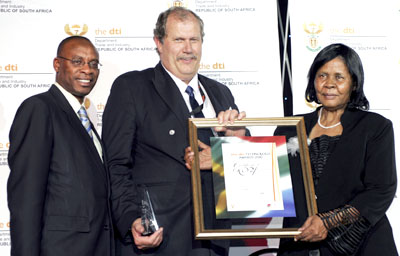Latest News Archive
Please select Category, Year, and then Month to display items
02 January 2025
|
Story Gerda-Marie van Rooyen
|
Photo Supplied
 Leading the research in South Africa is Prof Linus Franke from the Department of Soil, Crop and Climate Sciences.
Leading the research in South Africa is Prof Linus Franke from the Department of Soil, Crop and Climate Sciences.
Scientists are actively pursuing the successful breeding of diploid hybrid potatoes from inbred lines. This is expected to revolutionise potato breeding as it holds the key to rapid genetic progress. It will introduce new varieties for commercialisation through seed. Currently, existing potato variants have a gene that renders self-pollinated seeds infertile.
Prof Linus Franke, an academic in the Department of Soil, Crop and Climate Sciences at the UFS, is leading the research in South Africa. “This technology allows the production of genetically uniform potato seed that is easy to transport and largely disease-free.” He says this differs from conventional breeding whereby only vegetative propagation is possible due to tetraploid varieties in potatoes. It also risks carrying pests and diseases from one generation to the next – leading to the accumulation of pests and diseases with each round of multiplication.
Seed innovation
Prof Franke explains that Solynta BV, a seed company based in the Netherlands that produces potato varieties that can be grown from seed, has included South Africa in their research efforts because it is one of Africa’s largest producers and exporters. Through his academic relationship with Wageningen University and Research, a Dutch institution renowned for its agricultural endeavours and food production, the UFS became involved in researching hybrid potatoes grown from seed.
Diploid seeds containing two sets of chromosomes allow easier gene manipulation to increase predictability and speedier genetic progress. The breeding approach enables the incorporation of tolerance to pests, diseases, abiotic stresses (cold, heat, drought) and other desired genetic traits.
Although Prof Franke is optimistic about this research, he is not blind to disadvantages. “Potato seeds are tiny and have little energy reserves, making it harder to grow potatoes from seed than from tubers.” He says potatoes from seed will take longer to cultivate than tubers, as farmers need to grow plantlets from seeds first, adding six weeks to the growing period. “It is possible that commercial farmers can grow potatoes directly from seed. Alternatively, perhaps more likely, specialised growers will produce tubers of potatoes from seed; these tubers are then sold as seed tubers to other potato farmers, who then continue their normal practices of producing potatoes for the market from tubers.”
Financial benefits
Prof Franke says farmers have reason to get excited. “Seed potatoes will reduce input costs, as varieties with enhanced tolerance to pests and diseases require less pesticides. Planting one hectare of potatoes requires three to four tonnes of potato tubers, but only one 25 g packet of potato seeds.” Since potatoes are a more valuable commodity than maize, this technology might also increase farmers’ income potential.
UFS Chemistry wins dti award
2010-11-02
 |
|
At the awards ceremony are, from the left: Director-General of Trade and Industry Mr Tshediso Matona, Prof. Andreas Roodt and the Deputy-Minister of Trade and Industry, Ms Bongi Maria Ntuli.
Photo: S Osman
|
The research group of Prof. Andreas Roodt, Head of the Department of Chemistry at the University of the Free State (UFS) in Bloemfontein, won the first prize in the category Development of Small Medium and Micro-Enterprises (SMME) at the annual Department of Trade and Industry’s (dti) award ceremony.
Prof. Roodt received the prize for the high-technology project Development of novel nuclear pharmaceuticals in the Technology and Human Resources for Industry Programme (THRIP).
The Deputy-Minister of Trade and Industry Bongi Maria Ntuli, and Director-General Tshediso Matona presented the prize at the gala dinner held at Gallagher Estate, Gauteng in October 2010.
The dti’s Annual Technology Awards recognise excellence in research and aim to raise awareness on the benefits of using technology to improve the competitiveness of enterprises, within the local and global arena. Individuals and organisations are recognised for their efforts in advancing and promoting technology interests and emerging enterprises.
The technology awards cover the achievements of three of the dti technology programmes collectively, namely THRIP, managed by the National Research Foundation (NRF); the Support Programme for Industrial Innovation (SPII) managed by the Industrial Development Corporation (IDC); and the Small Enterprise Development Agency (seda) Technology Programme (stp).
Prof. Roodt, also vice-president of the European Crystallographic Association, who has just returned from a series of lectures abroad after being elected Fellow of the Royal Society of Chemistry in the UK, has received funding in excess of R3 million over the past two years to set up a specialised laboratory for synthesising active compounds. Key partners in this project are Dr Gerdus Kemp from PETLabs Pharmaceuticals in Pretoria; Prof. Connie Medlen (pharmacologist), recently appointed affiliate professor at UFS Chemistry; as well as Prof. Deon Visser from the Inorganic Chemistry research group at the UFS.
The research aims to produce new nuclear medicinal agents for the early diagnosis of cancer, heart and brain defects, and even HIV/ Aids.
Two doctoral students, Alice Brink and Marietjie Schutte, are currently actively involved in this project. They are the recipients of prestige scholarships introduced by the UFS Rector and Vice-Chancellor, Prof. Jonathan Jansen, under the UFS Research Initiative (the Advanced Biomolecular Systems Cluster) to complete their Ph.D. studies.
Media Release
Issued by: Lacea Loader
Director: Strategic Communication (actg)
Tel: 051 401 2584
Cell: 083 645 2454
E-mail: loaderl@ufs.ac.za
2 November 2010